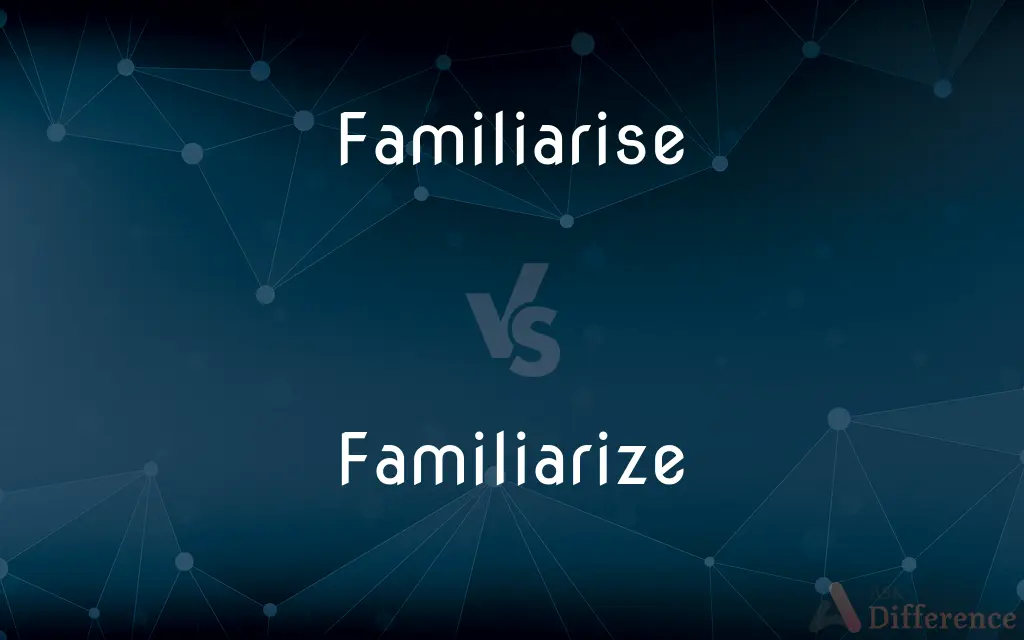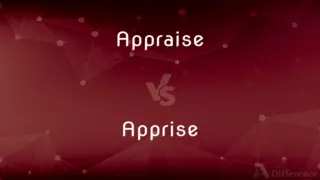Familiarise vs. Familiarize — What's the Difference?
By Tayyaba Rehman & Fiza Rafique — Updated on April 4, 2024
Familiarise focuses on British English, emphasizing getting to know something, while familiarize is its American counterpart, stressing the process of becoming well-acquainted.

Difference Between Familiarise and Familiarize
Table of Contents
ADVERTISEMENT
Key Differences
Familiarise is commonly used in British English, suggesting the process of becoming well-informed or accustomed to something. This usage reflects the broader context of British spelling conventions, which often include more "s" forms than "z" forms found in American English. On the other hand, familiarize is the preferred form in American English, illustrating the same process of gaining knowledge or comfort with something. This reflects a linguistic preference that aligns with other American English spellings, such as "organize" vs. "organise".
While familiarise might appear in academic or professional contexts within the UK and Commonwealth countries, emphasizing the importance of understanding or learning about something deeply, familiarize is more likely to be seen in American publications, educational materials, and professional documents. This distinction highlights the geographical preferences that can influence word choice in written and spoken English.
The choice between familiarise and familiarize can also indicate the intended audience of a text or speech. Authors or speakers might choose one variant over the other based on the cultural and linguistic expectations of their audience, whereas familiarize tends to be understood universally due to the global influence of American English.
In terms of pronunciation, both words are pronounced similarly in their respective regions, but slight variations in accent and emphasis can reflect their linguistic origins. While the pronunciation differences are minimal, they serve as auditory markers of the words' British or American usage.
Although the core meaning and usage of familiarise and familiarize remain consistent—both relate to the process of making someone acquainted with or knowledgeable about something—their spelling reflects broader patterns of variation between British and American English. This distinction is a reminder of the rich diversity within the English language and the importance of context in choosing the right word.
ADVERTISEMENT
Comparison Chart
Spelling Variations
British English, uses "s"
American English, uses "z"
Usage
Preferred in the UK, Australia, and other Commonwealth countries
Predominant in the United States
Pronunciation
Similar to familiarize, with regional accent variations
Similar to familiarise, with American accent variations
Contextual Preference
Academic, professional texts in British English-speaking regions
American publications, educational materials
Linguistic Influence
Reflects British spelling conventions
Aligns with American English spelling conventions
Compare with Definitions
Familiarise
To introduce or adapt someone to a new field or environment.
The orientation program is designed to familiarise new employees with company policies.
Familiarize
To get to know something; to make something well-known.
He took the course to familiarize himself with the basics of programming.
Familiarise
To bring into common use or knowledge.
The teacher aims to familiarise students with classic literature.
Familiarize
To introduce someone to a new area or subject.
The consultant was hired to familiarize staff with the new regulations.
Familiarise
To make oneself or others well-acquainted with something.
He familiarised himself with the new software.
Familiarize
To spread knowledge or information about something.
The campaign aims to familiarize the public with the health benefits of exercise.
Familiarise
To provide detailed information about a subject.
The manual familiarises users with the device's features.
Familiarize
To acquaint oneself with new surroundings or procedures.
Volunteers are needed to familiarize newcomers with the community services.
Familiarise
To become knowledgeable about something through study or experience.
She spent weeks familiarising herself with the city's history.
Familiarize
To make something common or generally understood.
The workshop helps to familiarize concepts of sustainability.
Familiarise
Standard spelling of familiarize
Familiarize
To make known, recognized, or familiar.
Familiarise
To make familiar or acquainted; same as familiarize.
Familiarize
To make acquainted with.
Familiarise
Make familiar or acquainted;
You should acquaint yourself with your new computer
We familiarized ourselves with the new surroundings
Familiarize
(ambitransitive) To make or become familiar with something or someone.
Familiarize
To make familiar or intimate; to habituate; to accustom; to make well known by practice or converse; as, to familiarize one's self with scenes of distress; we familiarized ourselves with the new surroundings.
Familiarize
To make acquainted, or skilled, by practice or study; as, to familiarize one's self with a business, a book, or a science.
Familiarize
Make familiar or acquainted;
You should acquaint yourself with your new computer
We familiarized ourselves with the new surroundings
Common Curiosities
Why do familiarise and familiarize exist?
They exist due to spelling conventions that differ between British and American English.
What is the main difference between familiarise and familiarize?
The main difference is spelling; "familiarise" is British English, while "familiarize" is American English.
Are there any pronunciation differences between familiarise and familiarize?
Pronunciation is largely the same, though regional accents might cause slight variations.
Is the meaning of familiarise and familiarize different?
No, both terms have the same meaning: the process of making someone knowledgeable about something.
How do I know whether to use familiarise or familiarize?
Choose based on the variant of English you are using or the audience you are addressing.
Do familiarise and familiarize have the same grammatical usage?
Yes, both function as verbs with the same grammatical usage.
Is one form older than the other?
The forms evolved concurrently with the development of American and British English spelling conventions.
Can familiarise and familiarize be used interchangeably?
Yes, they can be used interchangeably, but the choice of spelling depends on the variant of English being used.
Which is more commonly used worldwide, familiarise or familiarize?
"Familiarize" might be more universally recognized due to the global influence of American English.
Can the choice between familiarise and familiarize affect the understanding of a text?
Not significantly, as the difference is mainly in spelling and both words are understood in all varieties of English.
Is the use of familiarise declining with the global spread of American English?
It may be in some contexts, but "familiarise" remains strong in British English and Commonwealth countries.
Can using one variant over the other in a text signal anything to the reader?
Yes, it can signal the intended audience or the writer's linguistic background.
Are there tools to help decide which variant to use in writing?
Yes, writing software often includes language settings that can help enforce consistency in spelling.
How important is it to maintain consistency in using either familiarise or familiarize in a document?
Consistency is key for professionalism and clarity in any document, especially in formal writing.
Do any English variants besides British and American prefer one spelling over the other?
Commonwealth countries typically follow British spelling conventions, thus preferring "familiarise."
Share Your Discovery

Previous Comparison
Ethics vs. Ethical
Next Comparison
Appraise vs. AppriseAuthor Spotlight
Written by
Tayyaba RehmanTayyaba Rehman is a distinguished writer, currently serving as a primary contributor to askdifference.com. As a researcher in semantics and etymology, Tayyaba's passion for the complexity of languages and their distinctions has found a perfect home on the platform. Tayyaba delves into the intricacies of language, distinguishing between commonly confused words and phrases, thereby providing clarity for readers worldwide.
Co-written by
Fiza RafiqueFiza Rafique is a skilled content writer at AskDifference.com, where she meticulously refines and enhances written pieces. Drawing from her vast editorial expertise, Fiza ensures clarity, accuracy, and precision in every article. Passionate about language, she continually seeks to elevate the quality of content for readers worldwide.














































